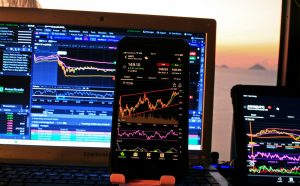
What is greed?
Greed is not always what it seems at first sight. Sometimes people might think that they are not greedy simply because they do not take all their profit at once or occasionally lock in some small profits to reduce overall risk exposure.
For example, a trader who takes 3% profit every day on their positions would undoubtedly be considered as not being greedy by most people. However, this trader would still technically be classified as greedy since the real aim of trading is not to take small profits here and there; instead, it is to make the most significant possible profit over time.
Different form of greed
There is also another type of ‘greed’ which does not necessarily manifest itself in the decision to lock in some part of your profits. It happens when you decide to keep all your winning trades open even if they are no longer giving significant signals. This behaviour typically manifests itself most often when traders get excited about their winning trades or just after they have had a string of consecutive winning trades.
Sometimes novice traders might keep their profitable positions on because they do not know what else to do with them. This type of greed is more like an emotional state since it results from excitement, fear or lack of knowledge.
How to avoid greed when trading forex
The first thing that you should keep in mind is that trading is not the same as gambling. With gambling, you aim to win money, but with trading, it is to make the best possible profits over time for the least amount of risk exposure.
You should never forget this and act accordingly. An example of how this could be done would be if you were holding a trade overnight based on its chart pattern or technical indicators only, then consider taking some profit off the table since this particular trade will most likely reach its maximum potential within a day two.
On another note, if you find yourself about to put on a trade based on emotions alone, then take a step back and wait for more clarity before proceeding. If you manage to follow those two golden rules, you will be well on your way to becoming a more profitable trader.
There are many reasons why people lose money when trading. Some of the most common ones are overtrading, lack of risk management, money management and greed. Greed is something that can affect anyone, beginners or advanced traders alike. It even affects experienced traders sometimes.
A study discovered that greed is the dominant motivation in interpersonal economic decision-making. But with forex trading, there are some things you can do to avoid deviating from your target and becoming greedy.
Set up achievable goals
Don’t set unrealistic targets such as double what you currently have within a month or so. You should set smaller milestones along the way to keep yourself motivated and prevent yourself from giving up if you don’t meet your larger goal straight away. Also, during specific periods where price fluctuation slows down considerably, traders tend to feel frustrated and quit as they feel like they aren’t making any progress.
Don’t put all of your eggs in one basket
Stop watching the prices constantly and don’t trade during work hours (especially not at work). It’s best to set a daily goal for yourself; after doing research or homework on upcoming events that may affect price movement, place trades only until near to the close-to-the end of the day when you know for sure which direction prices will go next. Doing this makes it easier to make your decisions calmly and keeps your emotions out of the whole thing.
Never invest more than you can afford to lose
It’s essential that you set stop-losses on every trade. Otherwise, your greed will take over and cause you to hold trading positions open for too long; this is an excellent way to end up losing all of your investments. A successful trader knows when to hold onto their winning trades and cut off the losing ones. These concepts are part of fundamental technical analysis, but greed often causes traders to ignore them completely.







